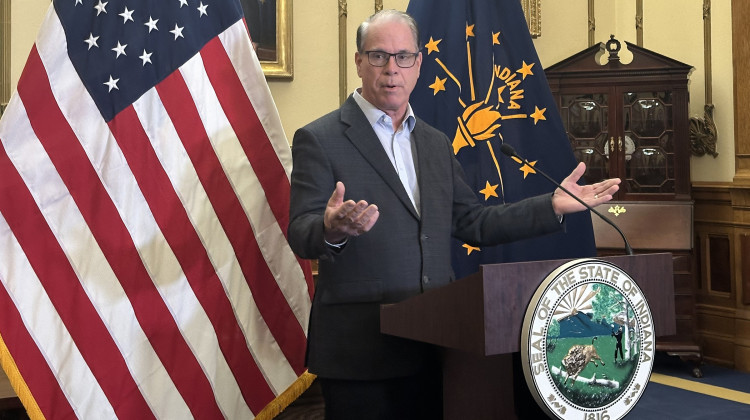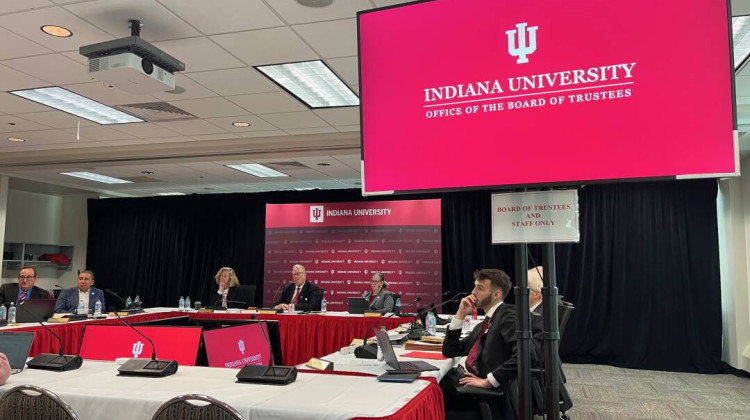
Gov. Mike Braun announced his priorities for the next two-year state budget on Thursday, Jan. 16 2025 at the Indiana Statehouse.
Rachel Fradette / WFYIHave a news tip for WFYI's education team? Share it here.
Gov. Mike Braun’s proposed budget expands private school vouchers to all families, delivering on a campaign promise to give parents more choices to educate their children.
His investment in the state’s choice program is a fraction of the proposed budget for the next two years. That cost is projected at more than $180 million across the two-year budget.
Braun unveiled his budget to lawmakers from the Statehouse Thursday, sharing how he hopes to get more money in the classroom, not operations and administrators. Braun can propose a budget and expectations for spending but lawmakers will take the next four months to write and debate it in both chambers. The budget will be finalized by April.
Braun’s plan would increase K-12 tuition support by 2% in each year of the budget. Overall, the budget proposal would increase $181 million in 2025-26 and $365 million in 2026-27 to K-12 tuition support. Braun’s budget includes $50 million for education initiatives, which were not shared Thursday.
His plan for property tax relief – defined in Senate Bill 1 – could put some pressures on school district budgets across the state. This makes his boosts to education more modest than previous years.
Secretary of Management and Budget Lisa Hershman said the budget proposal is just the start and Braun’s budget team will work with lawmakers through it. Hershman now oversees the state’s budget after Braun appointed her last month.
“We understand this is just the first report,” Hershman said. “We are a third of the process. We know that both chambers will have input.”
K-12 education accounts for about 47% of the current two-year state budget, which totals $44.6 billion.
Here are five priorities in Braun’s budget that impact schools:
Universal vouchers
Senate and House GOP leaders have signaled support of Braun’s wish to see choice expanded in the state. Most Indiana families are already eligible based on income. Braun’s spending plan cements that vouchers will be universal.
“We've gotten very close to that because we've been on that a long time,” Braun said. “I come from a great public school district. Kids have gone there, grandkids. Not all places have it. When you don't, you need options because you don't want parents to be in a dead end.”
Universal school vouchers would allow any Indiana family to attend private, parochial, or non-religious schools using state funds through the Choice Scholarship Program.
During the last school year, the state hit a record and paid $439 million in tuition vouchers to private parochial and non-religious schools. The 2023 expansion was projected to cost the state $1.136 billion over two years but those changes removed many requirements to the program.
While this expansion has an impact, it’s not quite as significant due to so many barriers already removed for families who want to leave the public school system.
Rep. Bob Behning (R-Indianapolis), who chairs the House Education committee told WFYI in December that the state was close to universal.
“It’s a relatively small investment just to make that next step,” Behning said.
By eliminating the income eligibility requirment, a universal system is projected to cost more than $88 million in fiscal year 2026 and more than $94 million in fiscal year 2027, according to projected numbers from the nonpartisan Legislative Services Agency. Plus, LSA projects another $86,000 for the state's Department of Education to expand and oversee the program.
For the 2024-25 school year, a family of four can earn up to $230,880 to receive a voucher, according to Indiana Department of Education guidelines. Indiana's median household income is about $67,000, according to the U.S. Census Bureau.
Vouchers for students with disabilities, career training
Under Braun's proposed budget, the Education Savings Account program would receive a $30 million cap, up from $10 million utilized for scholarships this year.
Right now, nearly all families are eligible due to previous changes that removed requirements and raised the income cap to $230,880 for a family of four.
Education Scholarship Accounts, or ESAs, which provide money to families of students with disabilities, serves more than 1,000 students. The program is only open to families who leave the public school system.
Rep. Greg Porter (D-Indianapolis) said he was concerned where the money will come from to expand vouchers and other choice programs like ESAs. Sen. David Niezgodski (D-South Bend) knows vouchers aren’t going away but he wants more transparency in the system.
“Transparency so we can see exactly how these schools are performing,” Niezgodski said.
Braun promised to double the program’s size on the campaign trail. His spending plan would also provide a $2 million bump in funding for Career Scholarship Accounts, or CSAs.
The state scholarship program provides funds to students so they can pursue their career interests through internships or job training. The program distributed all of its funds to participating students this school year, like ESAs.
Property tax pressure
SB 1, authored by Sen. Travis Holdman (R-Markle), would seek property tax relief in a number of ways, including a cap on property tax increases.
The governor is asking to give tax relief in other places, like phasing out the tax on retirement income over four years.
Property tax reform – wherever it lands after months of debates – could greatly impact local government and schools. SB 1 could cost school districts more than $535 million in the budget’s first year, the bill’s fiscal note estimates.
The biggest losers in this are Marion and Hamilton counties, where estimated changes in revenue show more than $140 million each.
Braun said school districts that relied heavily on property tax increases each year showed “poor management”.
“The ones that poorly managed how they spent it and overtaxed in the process are who we're going to get back down to Mother Earth,” Braun said.
Teacher pay boost
Braun forged ahead with increasing teacher pay, another campaign promise. The current state-mandated minimum pay for teachers in Indiana is $40,000 a year.
Although it’s not in his budget, Hershman said Braun would increase starting pay for new teachers to $45,000. Senate Bill 146 would see this through. The average pay for first-year teachers is $48,129, according to state data.
No sales tax ahead of back-to-school
Braun’s budget builds in multiple sales tax holidays that would make it “easier for Hoosier families” ahead of back-to-school and outdoor recreational seasons.
Many other states hold these holidays with the majority of them in the summer.
In Florida, there are multiple sales tax free weeks for both school and disaster preparedness. But each state has exemptions and limitations to what can be purchased and for how much.
Details on Braun’s plan were limited but he hopes there will be other opportunities to offer more of these holidays.
“I'm going to look for others that are going to have impact,” Braun said. “How do you do it? You run the government more efficiently. That's how you pay for it.”
What comes next?
The state’s revenue forecast showed that economic growth could mostly plateau by the end of the biennium.
Republican leaders will want to maintain their budget surplus in the first year to prepare for what could be tough headwinds in year two, Chad Ranney, the state’s budget director. That and other factors – like the state’s Medicaid shortfall – make it a tight budget year.
In her weekly newsletter, Secretary of Education Katie Jenner said there’s already “momentum” for schools and students in the legislative session.
“In what is a very tight budget year, this is a positive starting point for K-12 education, and we must continue to advocate for these tuition support increases over the next few months,” Jenner wrote.
This story was updated with projected costs of expanding the Choice Scholarship Program.
Rachel Fradette is the WFYI Statehouse education reporter. Contact Rachel at rfradette@wfyi.org.
 DONATE
DONATE







 Support WFYI. We can't do it without you.
Support WFYI. We can't do it without you.